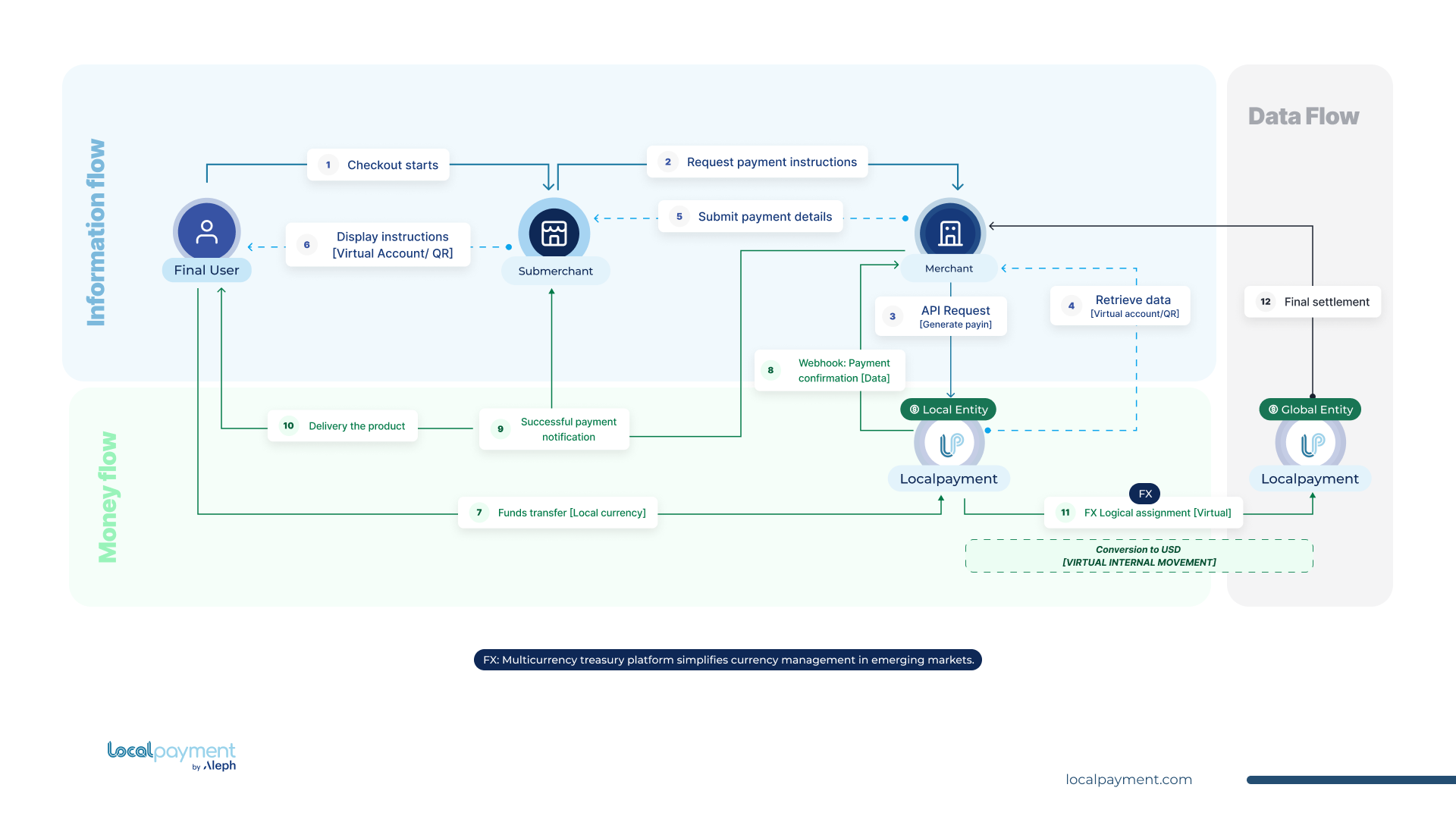Payins Overview
Accept global payments seamlessly with a Payins solution. Drive higher conversion rates by processing one-time purchases & recurring subscriptions while complying with local regulations and preferred payment methods.
Accepting payments from customers across diverse markets requires understanding local preferences, regulations, and payment behaviors. Whether you're processing one-time purchases, setting up recurring subscriptions, or managing complex payment flows, having the right infrastructure in place is essential for success.
This is where Payins solutions come into play. A payin is the act of accepting funds from customers through various payment methods, providing merchants with faster transaction processing, unified payment management across multiple countries, and access to local payment preferences that drive higher conversion rates.
Key Benefits
- Fast Processing: Real-time authorization for Cards with instant feedback, asynchronous processing for APMs, Virtual Accounts, and Cash with webhook notifications.
- Comprehensive Coverage: Accept payments in 8+ Latin American countries with local payment method preferences.
- Unified Platform: Single API integration for multiple payment methods and countries, reducing development complexity.
- Local Optimization: Support for regional payment preferences including CoDi, PIX, PSE, and cash networks.
- Advanced Features: 3D Secure authentication, tokenization, installments, and subscription management.
- Complete Lifecycle Management: From payment initiation to settlement, refunds, and chargeback handling.
- Regulatory Compliance: Full adherence to local financial regulations and security standards across all supported markets.
Supported Payment Methods
Complete card payment processing with One-Time Payments, Tokenization, 3D Secure and Installments. Includes full support for Refunds and Chargeback management.
Dedicated deposit details for individual or batch processing with automated reconciliation. Complete alias lifecycle management: create, resend, confirm, and cancel virtual accounts.
Local account-to-account rails including CoDi, PIX, PSE, QR variants and ETPAY. Asynchronous processing with real-time webhook notifications for status updates.
Cash-in networks with voucher and receipt-based systems. Generate payment codes for customers to pay at physical locations with complete tracking and confirmation.
Recurring billing backed by eligible payment rails, commonly card tokenization. Complete subscription lifecycle management: create, update, cancel, and status monitoring.
Global Coverage
Our payment solutions are available across key Latin American markets, with each country offering specific payment method combinations optimized for local preferences:
How Payins Work
The payin lifecycle involves three parallel flows: the Information Flow (payment instructions), the Money Flow (funds movement and conversion), and the Data Flow (final settlement notification). Here is a step-by-step breakdown of how a payin is processed from checkout to settlement.

Information Flow: Payment Initiation & Instructions
- Checkout starts: The customer starts a purchase on your platform.
- Request payment instructions: Your system assembles all the required parameters for the transaction: amount, currency, country, payment method, account number, and any method-specific fields (e.g., document ID, bank code).
- API request: Your system calls the Create Payin endpoint with the fully structured payment request.
- Retrieve data: The API responds with the payment method–specific data: virtual account details, QR code, or redirect URL.
- Submit payment details: Your backend forwards the payment instructions to your frontend or directly to the customer's checkout session.
- Display instructions: Your platform shows the QR code, virtual account number, or redirect link to the end user.
- Funds transfer: The customer pays the exact amount in local currency (e.g., BRL, CLP, MXN) via their banking app, cash network, or card. Funds are sent directly to Localpayment's local entity.
Money Flow: Funds Transfer & Settlement
- Webhook: Once the funds are credited, we immediately send a webhook to your configured endpoint.
- Successful payment notification: Your system receives the webhook, verifies the signature, and updates your internal ledger to reflect the successful transaction.
- Delivery the product: The merchant completes the order lifecycle by providing the purchased item, digital content, or service access to the customer.
- FX Logical assignment: We perform a virtual (non‑physical) FX conversion from the local currency to your settlement currency (usually USD). This locks the exchange rate and updates your internal balance in real time.
Data Flow: Final Settlement
- Final settlement: The funds are converted and credited to your Internal Localpayment Account. They are now ready for payouts, internal transfers, or treasury management.
Post-Payin Operations
After initiating a payin, several management actions are available depending on the transaction status, payment method, and local regulations:
Complete Refund Support
- Supported Methods: Cards, Virtual Accounts, Cash and APMs.
- Automatic Compliance: Built-in adherence to rail-specific and country-specific refund rules.
- Status Tracking: Real-time refund status monitoring through unified API.
- Processing Times: Varies by payment method and regional banking requirements.
Key Features:
- Seamless integration with existing payment flows.
- Comprehensive audit trail for all refund transactions.
Complete Dispute Lifecycle Management
- Evidence Upload: Submit compelling evidence documentation.
- SLA Tracking: Automated monitoring of response deadlines and requirements.
- Full Audit Trail: Complete record from dispute initiation to final resolution.
Management Tools:
- Centralized dashboard for all dispute cases.
- Integration with card network dispute resolution systems.
- Comprehensive reporting and analytics on chargeback trends.
Flexible Cancellation Support
- Eligible Methods: APMs and Cash payments.
- Automatic Expiry: Built-in time limits for time-sensitive payment methods.
- Customer Notifications: Automated alerts for cancellation status updates.
Cancellation Features:
- Instant cancellation processing for eligible transactions.
- Integration with payment method-specific cancellation rules.
- Complete transaction lifecycle management.
Comprehensive Settlement Management
- Wire Out Functionality: Transfer collected funds to designated bank accounts.
- Balance Monitoring: Real-time visibility into collected payment balances.
- Settlement Scheduling: Configure automatic or manual settlement preferences.
- Multi-Currency Support: Handle settlements across different currencies and regions.
Treasury Tools:
- Customizable settlement timing and frequency.
- Multi-bank account support for different currencies.
- Comprehensive settlement reporting and reconciliation.
- Integration with existing treasury management systems.
Updated 12 days ago
